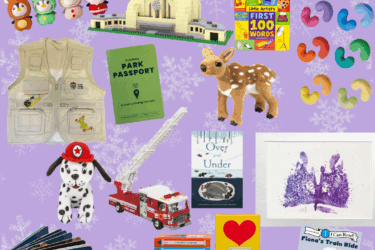Avoid jilted feelings in older brothers and sisters by involving them in the upcoming arrival!
 Avoid jilted feelings in older brothers and sisters by involving them in the upcoming arrival!
Avoid jilted feelings in older brothers and sisters by involving them in the upcoming arrival!
MaryAnn Chidlow’s son, 4-year-old Steven, could barely contain his excitement when his mom went to the hospital. She had involved him in every aspect of her preparation for the new baby and he knew his job. “When I brought David home from the hospital, Steven was waiting in the car with his great-grandmother. The first words out of his mouth were ‘Mommy! You brought me my baby!'”
Every parent wishes this transition could go so smoothly. Medical studies have shown that the addition of a new family member often ranks among the most traumatic in a young child’s life. For many brothers and sisters, resentment that leads to rivalry begins when the baby first comes home from the hospital.
Chidlow admits that when her boys grew older, “they argued and fussed what seemed like continuously, but they still took care of each other. Heaven help whoever picked on one of them! The other was right there.”
Despite the fighting, her children love each other.
Unbreakable bonds between siblings, which begin developing when the newest child is still in the womb, give confidence and strength for success in life. Like Chidlow, many parents find that involving preschoolers in the planning for a new babyl helps them love the sibling from the moment of arrival.
Tell Your Preschooler Early in the Pregnancy
A big life-changing event takes time to accept. Children who learn early about a new baby on the way are more accepting at the time of the infant’s birth. To them, it seems as though the baby has been there the entire time. The only difference now is that they can see and touch the new baby now. They may not be able to play with the infant (yet!), but that’s only a matter of time. They CAN be of help. Since the baby has transformed from an invisible entity to an interactive creature, he becomes more fun!
Use a Name
Give older siblings a name to call the new baby. It doesn’t need to be the name you plan on using. Harold Ratliff prepared his first son, Shaun, who was born with cerebral palsy, by saying that the unborn child was “his baby.” “Ever since,” says Ratliff, “Shaun has called his brother ‘His Baby.'” Shaun’s disability makes speech difficult, but some words are easier to speak. “‘His Baby’ was something he could say.” Providing a name gives a child a sense of identity and a way to relate to his baby brother.
Encourage Communication With Tummy Talk
Preschoolers love to talk – even to an unborn child! They understand that the baby is there. Elaine Britt worried about “the jealousy thing” with her two boys, but after the first trimester, she started talking about the new baby, Kevin, as if he was already part of the family. “I would invite Bryan, my older son, to come up and rub my belly and talk to ‘baby Kevin,'” she says. “He put his face right up to my clothes and talk, sometimes very loudly, to his little brother. When Kevin started kicking, it was even more real to Bryan.”
When Kevin was born, Elaine noticed that he responded immediately to Bryan’s voice. The bonding had happened even before Kevin was born.
Tummy talk allows siblings to meet without the risk of jealousy from the older child. There are many ways children can talk to the new baby; give your child the chance to choose what is comfortable for him.
Sibling Responsibilities
Preschoolers love to be helpful and are thrilled to have an important role in a new baby’s life. While it’s important to tell small children that they need to be careful, you can soften the directive by saying something like, “Babies break easily. Please ask if you want to touch the baby and Mommy will help you.” This is simple enough for a preschooler to understand. He will be happy to know that as a big brother, the baby will look up to him. He can help by handing you a diaper or diaper wipe, singing songs to the baby as he lies in the crib or giving gentle kisses to the top of his head. These are vital jobs that only a preschooler can fill.
Big Brother/Sister Class
Many local hospitals offer classes to prepare siblings for a new brother or sister. This is a great way to involve children in the child’s birth and to back parents up with professional explanations of the roles of big brothers and sisters.
Winslow took her two children to a “Getting Ready for Baby” class at the hospital where her new baby was to be born. “They got to tour the delivery room and the nursery,” she says. “All the kids in the class decorated canvas tote bags that read, ‘I’m a big sister or brother.'” This is yet another great way for preschoolers to be included in the preparations for the birth of a baby.
Prepare Your Child for Your Hospital Visit
Tell siblings ahead of time that when the baby is born you will be in the hospital (if this is your birthing choice) for however long your stay may be, let them know who will be caring for them in your absence. Repeat this on a few occasions during the last few weeks of your pregnancy. This way, if your child wakes up one morning and you’re missing, he won’t worry about you.
“I put my children to bed before going to the hospital for the birth of my third child early the next morning,” says Britt. “We had made arrangements for a friend to stay with the girls, and my husband left the house to come and join me at the hospital an hour or so after she arrived. Later, when my children woke up, our friend was there, and my older daughter said, ‘Is Katie born yet?’ She knew she did not need to worry about us.”
Daughters are Mommys; Sons are Daddies
Girls are often thrilled to receive a baby doll‚ like their very own new baby. It gives them a chance to be a mother like Mommy without risking the safety of the newborn. Genetta Adair bought a realistic baby boy doll for her 4-year-old daughter when her baby brother was born. Adair gave the doll to her daughter when she came to the hospital to meet her baby brother for the first time. Her daughter named the doll Taylor Glenn and carried him around when Adair carried the baby. “We bought a doll bottle and doll diapers, and she fed and changed Taylor Glenn while I fed and changed her brother,” says Adair.
At the Hospital
On the big day of your baby’s arrival, your preschooler will probably want to hold the new baby. A good way to manage this is to have someone (if not you) hug and hold your preschooler as he gently cradles the newborn in his lap. Your preparations have lead up to this moment, and siblings will pass with flying colors as you continue to include them. Loving bonds will begin.
No matter what you do, as they grow, siblings will argue. As an experienced mom with four grown children, Betty Winslow has excellent advice for young mothers.
“You can’t force your children to love or even like each other,” she says. “If they are at least civil to each other and stop trying to hurt each other, be happy. But children do grow up, and someday, you may be amazed to realize that the brothers who tried to kill each other during their childhood become great friends as adults and the brother who was such a pest to his sister is now her right arm in times of trouble.
Terri Pilcher is a freelance writer and the mother of three children all under the age of 4.
Books Can Help
Arthur’s New Baby Lift-the-Flaps Board Book
by Marc Tolon Brown
Bullseye Books
Recommended for toddlers and preschoolers.
The Berenstain Bears’ New Baby
by Stan and Jan Berenstain
Random House
All ages will enjoy this classic.
I’m a Big Brother/I’m a Big Sister
by Joanna Cole
William Morrow & Co.
Recommended for ages 4 – 8, but toddlers will love this book.




